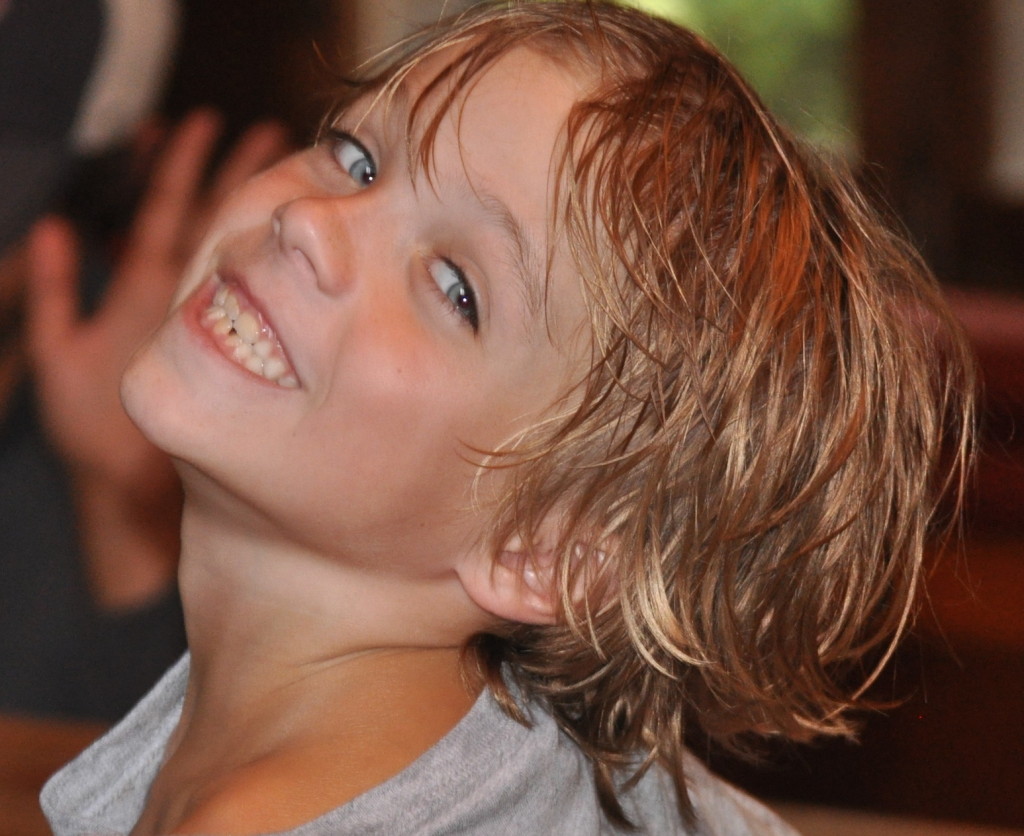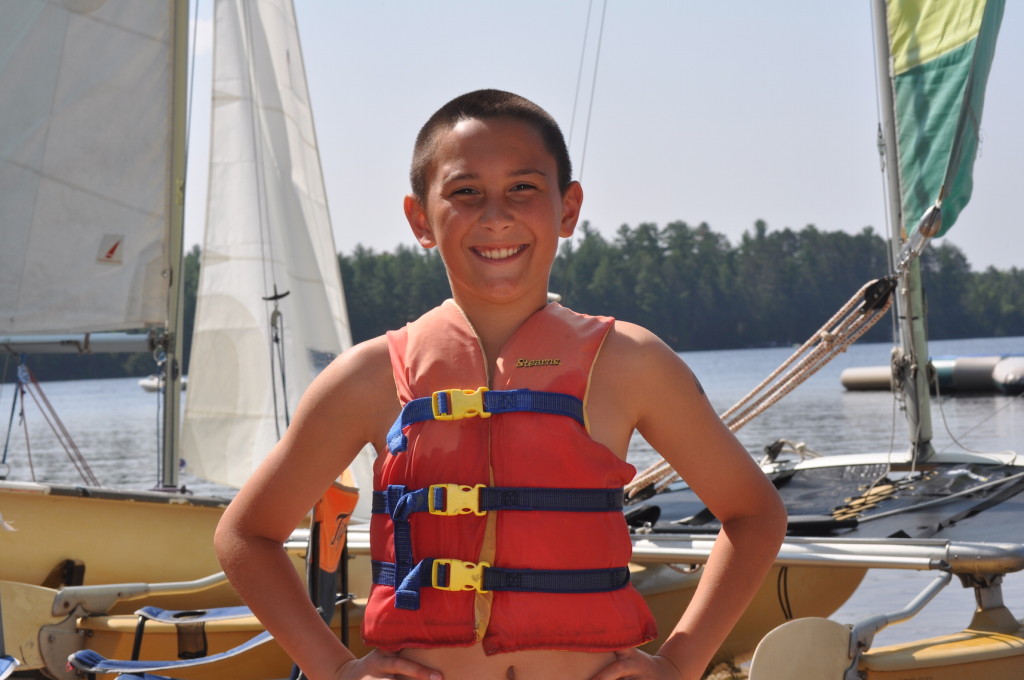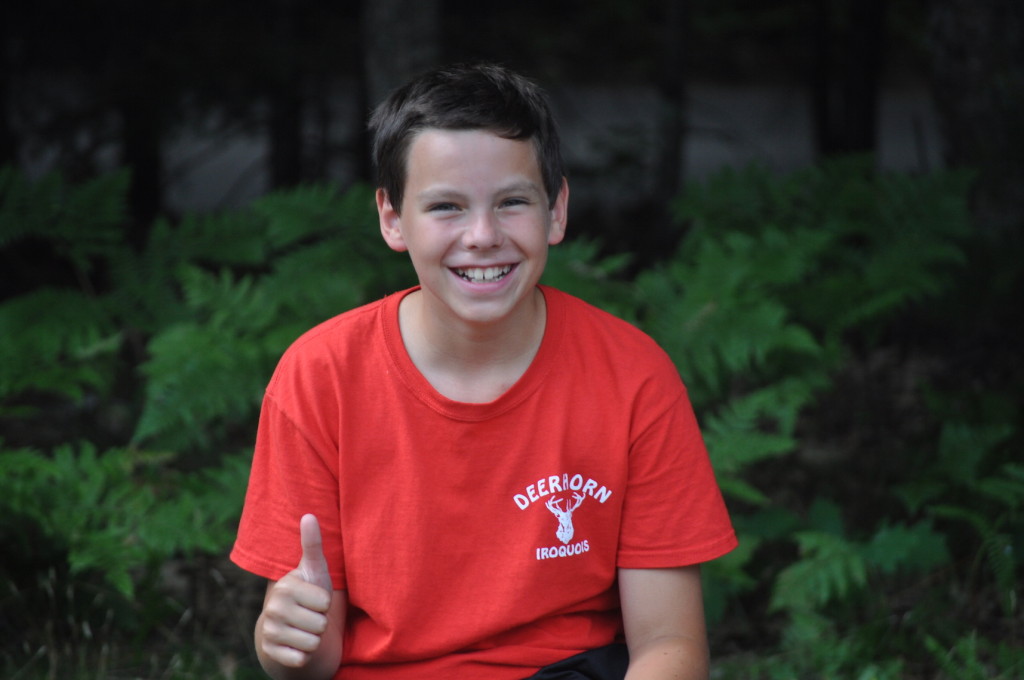This summer at Deerhorn, so far we have 128 campers who will be spending their first summer at Deerhorn. That’s more than one third of our campers who will get to experience the magic of camp for the first time. We know that many of those campers (and parents!) will have worries and concerns about spending a few weeks away from home. To help prepare you, and your camper, for his first summer at Deerhorn, we have some advice that comes from decades of helping first-year campers adjust to camp. Many thanks to Blaine for compiling these great suggestions.
Thousands of boys have attended Camp Deerhorn since 1930. Every boy was a first time camper at Deerhorn at one point. Most first time campers have many questions and a few fears about going away to camp for the first time. There is also a separation anxiety felt by many boys, and parents. All of these feelings are normal. Preparing for camp as a first time camper, or a nervous returning camper, is a very important step in you and your son’s adventure this summer at Camp Deerhorn. Every camper is different, but the following information will help get your son’s adventure off to a good start. Throughout this process, keep in mind that sending your son to summer camp is one of the best things you can do as a parent to help raise a healthy, well-adjusted, and self-sufficient young man.
Share the Experience
Parents should be involved and include the camper in preparations for camp. Include the camper in what to pack for his journey, and how to keep his gear organized. Take your camper shopping for things he will need at camp. Allow him to pick a few items, like a water bottle, or new kind of shampoo, to help him feel involved.
Set Goals
Before your camper departs for Deerhorn, spend some time together creating goals for their experience at camp. It might be to waterski for the first time, or try a few new foods, or make a new friend from a different hometown. Have your camper write down his goals, and take them to camp with him. Include envelopes already addressed to your home, and encourage your camper to update you on his goals in his letters home. When you write to your camper, ask about these specific goals.
Manage Expectations
Be positive about the upcoming adventure, but also be realistic. Camp, like the rest of life, has its ups and downs. Not every minute of every day will be filled with excitement. Let your camper know that it may take a few days to get into the rhythm of camp life. This anxiety is a normal response to a new experience. Deerhorn has procedures in place to keep all campers active and engaged from the start, to help boys settle in as fast as possible.
Letters to Campers
Campers love to get mail from home, so send some. Some parents even mail a letter before their son leaves for camp so it is waiting for him when he arrives. However, make sure to avoid the following: 1. Bad news. Your camper does not need to add worrying about home to his day. (If you have urgent bad news, please call and speak to a camp director about it, and we can decide together how to handle it.) 2. Great news from home, that may be more fantastic than camp, like, “We got a new pool. And, by the way we are at Disneyland having fun.” 3. Don’t send notes that may make your camper feel guilty for having fun at camp. “The house is so lonely without you.” or “I am so sad you are not here with me.” Instead, when writing letters, ask lots of specific questions about camp, new friends he has made, how he is progressing on his camp goals, and make home seem neither terrible nor particularly interesting. Tell them how excited you are for them and their great adventure, and how you can’t wait to hear all about their adventure and new friends when he returns home.
Communicate with Camp
Parents and camp personnel need to work as partners in your camper’s experience. If your camper has particular challenges, or if there were major life changes before coming to camp, it is best to communicate openly with the camp. Information and suggestions on how these particular challenges are handled best at home and school will help make his summer experience as positive as possible.
Most Importantly
Under absolutely no circumstances should you promise to pick your camper up early from camp if they are not having fun. Making this promise often leads campers to take the easy way out. Just like the rest of life, there will be good times and challenging times that campers and camp staff will work through together. Your camper is human, and the path of least resistance (leaving) is so much more tempting than putting in mental energy to stick it out. If a camper struggles to overcome homesickness, they often gain resiliency, confidence, and a sense of accomplishment. We have found that many boys that get through their homesickness, create a bond with camp and return for many years. We often find that letters written home by campers early in a session may contain some sad feelings. This is also very normal, and following letters almost always are much better. (In fact, by the time that letter arrives to you, the camper has usually forgotten he even wrote it!)
Goodbyes
We have found that, children leaving home and going away to camp for the first time is as difficult for the parent as it is for the camper. Dropping your camper off at camp or the camp bus is an exciting, hectic experience. It can be an emotional time for parents and campers. These feeling are also normal. Let yourself feel however you feel, AFTER YOU GET BACK IN YOUR CAR. A tearful goodbye may bring on feelings of sadness and guilt for leaving you alone.
Visiting
We don’t have special visiting days for parents, and we welcome parents to visit camp. However, before you visit your first-year camper, we encourage you to think about if it is in his best interest. We ask that parents do not visit within the first 4 days of camp, as campers are settling in and adjusting to life at camp. However, even after the first few days, a visit from parents can cause a major setback in a first-year camper. We know how hard it is to be apart from your son, but we have seen many nervous campers who were doing just fine at camp, fall apart when the parents come for a short visit and leave again. Many of our sessions are short, and allowing him that time to really get into camp is a gift to him.
Your camper’s summer experience will be a time of growth for both you and your son as your son learns independence and you learn how to let go. We like to tell parents that your son will walk a little taller when he gets home, not physically, but because of his increased self-esteem. This does not mean there will not be struggles along the way. As in other life experiences, we often learn more about ourselves from difficulties than in times of bliss. With your support and guidance, and a positive partnership with camp, your child will grow in ways you never imagined.



Great Advice! Our middle son, Dylan, is headed to camp for the frist time this summer! We are so excited for him and thankful he will be accompanied by his big brother Conner. We know that that this will settle any fears he may have, but also strengthen thier bond even more. What a great experience for brothers to have together.
Thanks, Christine! We are so excited to have another Tackett at camp! We know Conner will be a great role model for him!